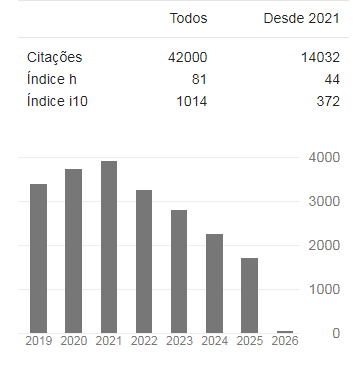Depression among the elderly in the family health strategy
a contribution toprimary care
DOI:
https://doi.org/10.5935/1415-2762.20160016Keywords:
Aged, Depression, Primary Health CareAbstract
Objective: The present study sought to estimate the prevalence of depression in the elderly at a Basic Health Unit (BHU) in order to identify cases of depression in the elderly patients that undergo follow-up treatment at this BHU and the use of drugs for the treatment of such disorders. Methodology: This was an exploratory and descriptive research with a quantitative approach, conducted with 241 elderly patients registered in the Family Healthcare Service (FHS) in the city of Teresina, PI, Brazil. Survey data were collected through the Geriatric Depression Scale (GDS) and analyzed using the SPSS software (version 11.0). The study was approved by the Research Ethics Committee at the UNINOVAFAPI University Center. Results: A high percentage of cases of depression in the elderly were identified. A higher prevalence was observed in females, of above 70 years of age, as well as in the widow/widower, retired, and no formal education categories. Regarding the severity of the situation, 26.6% were characterized as showing signs of mild depression, while 2.5% showed signs of probable severe depression. As for medication, most elderly people with severe depression do not use antidepressants, whereas 10.9% of the cases of elderly patients with mild depression reported only using anxiolytics. This study shows a significant rate of depression among the elderly. The analyzed variables demonstrate the need for more accurate research in the medical care provided to elderly patients in order to detect possible risk factors for depression. Conclusion: The recognition of depression in the elderly appears to be more difficult than at earlier ages, since healthcare professionals tend to attribute the onset of signs and symptoms to aging.
Downloads
References
Clegg A, Young J, Iliffe S, Rikkert MO, Rockwood K. Frailty in elderly people. Lancet. 2013[citado em 2016 abr. 20];381(9868):752-62. Disponível em: http://www.ncbi.nlm.nih.gov/pubmed/23395245 DOI: 10.1016/S0140-6736(12)62167-9.
Nascimento DCD, Brito MACD, Santos AD. Depressão em idosos residentes em uma instituição asilar da cidade de Juazeiro do Norte, Ceará, Brasil. J Manag Prim Health Care. 2014[citado em 2016 abr. 20];4(3):150-62. Disponível em: http://www.jmphc.com.br/saude-publica/index.php/jmphc/article/viewFile/182/185
Santos CA, Ribeiro AQ, Rosa COB, Ribeiro RCL. Depressão, déficit cognitivo e fatores associados à desnutrição em idosos com câncer. Ciênc Saúde Coletiva. 2015[citado em 2016 abr. 20];20(3):751-60. Disponível em: http://www.redalyc.org/pdf/630/63035388012.pdf DOI: 10.1590/1413-81232015203.06252014
Monteso P, Ferre C, Lleixa M, Albacar N, Aguilar C, Sanchez A, et al. Depression in the elderly: study in a rural city in southern Catalonia. J Psych Ment Health Nurse. 2012[citado em 2016 abr. 20];19(5):426-9. Disponível em: http://www.ncbi.nlm.nih.gov/pubmed/22070581 DOI: 10.1111/j.1365-2850.2011.01798.x
Kiosses DN, Szanto K, Alexopoulos GS. Suicide in older adults: the role of emotions and cognition. Current Psychiatry Reports. 2014[citado em 2016 abr. 20];16(11):1-8. Disponível em: http://www.ncbi.nlm.nih.gov/pubmed/25226883 DOI: 10.1007/s11920-014-0495-3.
Alvarenga MRM, Oliveira MAC, Faccenda O. Sintomas depressivos em idosos: análise dos itens da Escala de Depressão Geriátrica. Acta Paul Enferm. 2012[citado em 2016 abr. 20];25(4):497-503. Disponível em: http://www.scielo.br/pdf/ape/v25n4/03.pdf
Snowdon J. How high in the prevalence of depression in old age? Rev Bras Psiquiatr. 2002[citado em 2016 abr. 20];24 (Supl 1):42-7. Disponível em: http://scielo.br/pdf/rbp/v24s1/8856.pdf
Wild B, Herzog W, Schellberg D, Lechner S, Niehoff D, Brenner H, et al. Association between the prevalence of depression and age in a large representative German sample of people aged 53 to 80 years. Inter J Ger Psych. 2012[citado em 2016 abr. 20];27(4):375-81. Disponível em: http://www.ncbi.nlm.nih.gov/pubmed/21618284 DOI: 10.1002/gps.2728
Jimenez DE, Bartels SJ, Cardenas V, Dhaliwal SS, Alegría M. Cultural beliefs and mental health treatment preferences of ethnically diverse older adult consumers in primary care. Am J Geriatr Psychiatry. 2012[citado em 2016 abr. 20];20(6):533-42. Disponível em: http://www.ncbi.nlm.nih.gov/pubmed/21992942 DOI: 10.1097/JGP.0b013e318227f876
Cole MG, Dendukuri N. Risk factors for depression among elderly community subjects: a systematic review and meta-analysis. Am P Psychiatry. 2003[citado em 2016 abr. 20];160(6):1147-56. Disponível em: http://www.ncbi.nlm.nih.gov/pubmed/12777274
Chan CL, Wang CW, Ho AH, Qu ZY, Wang XY, Ran MS, et al. Symptoms of posttraumatic stress disorder and depression among bereaved and non-bereaved survivors following the 2008 Sichuan earthquake. J Anx Dis. 2012[citado em 2016 abr. 20];26(6):673-9. Disponível em: http://www.ncbi.nlm.nih.gov/pubmed/22721751 DOI: 10.1016/j.janxdis.2012.05.002
Mezuk B, Bohnert AS, Ratliff S, Zivin K. Job strain, depressive symptoms, and drinking behavior among older adults: results from the Health and Retirement Study. J Gerontol B Psychol Sci Soc Sci. 2011[citado em 2016 abr. 20];66(4):426-34. Disponível em: http://www.ncbi.nlm.nih.gov/pubmed/21427175 DOI: 10.1093/geronb/gbr021.
Oliveira MFD, Bezerra VP, Silva AO, Alves MDSCF, Moreira MASP, Caldas CP. Sintomatologia de depressão autorreferida por idosos que vivem em comunidade. Ciênc Saúde Coletiva. 2012[citado em 2016 abr. 20];17(8):2191-8. Disponível em: http://www.scielo.br/pdf/csc/v17n8/29.pdf
Brown EL, McAvay G, Raue PJ, Moses S, Bruce ML. Recognition of depression among elderly recipients of home care services. Psychiatr Serv. 2003[citado em 2016 abr. 20];54(2):208-13. Disponível em: http://www.ncbi.nlm.nih.gov/pubmed/12556602
Ferreira L, Roncada C, Tiggemann CL, Dias CP. Avaliação dos níveis de depressão em idosos praticantes de diferentes exercícios físicos Cons Saúde. 2014[citado em 2016 abr. 20];13(3):405-10. Disponível em: http://www.redalyc.org/pdf/929/92932100011.pdf
Costa JGF, Medeiros SM. Sofrimento psíquico e trabalho: uma revisão integrativa de literatura. Rev Bras Pesq Saúde. 2013[citado em 2016 abr. 20];15(2):116-21. Disponível em: https://www.google.com.br/url?sa=t&rct=j&q=&esrc=s&source=web&cd=1&ved=0ahUKEwj1_JzD1ubMAhUKgJAKHd3CA34QFggdMAA&url=http%3A%2F%2Fperiodicos.ufes.br%2FRBPS%2Farticle%2Fdownload%2F5683%2F4130&usg=AFQjCNElvMY1IC94-x3q8mfEyHWAQ8ME7A&sig2=P7uLPrXEq4veYH8ugkl3Wg&cad=rja
Clavenna A, Bonati M, Rossi E, Rosa M. Increase in non-evidence based use of antidepressants in children is cause for concern. Br Med J. 2004[citado em 2016 abr. 20];328(7441):711-2. Disponível em: http://pubmedcentralcanada.ca/pmcc/articles/PMC381270/ DOI: 10.1136/bmj.328.7441.711-c
Garcias CMM, Pinheiro RT, Garcias GDL, Horta BL, Brum CB. Prevalência e fatores associados ao uso de antidepressivos em adultos de área urbana de Pelotas, Rio Grande do Sul, Brasil, em 2006. Cad Saúde Pública. 2008[citado em 2016 abr. 20];24(7):1565-71. Disponível em: http://www.scielo.br/pdf/csp/v24n7/11.pdf
Groppo HS, Nascimento CMC, Stella F, Gobbi S, Oliani MM. Efectos de un programa de actividad física en los síntomas depressivos y la calidad de vida del ancianos con demencia de Alzheimer. Rev Bras Educ Fís Esp. 2012[citado em 2016 abr. 20];26(4):543-51. Disponível em: http://www.scielo.br/scielo.php?script=sci_arttext&pid=S1807-55092012000400002&lng=enDOI: http://dx.doi.org/10.1590/S1807-55092012000400002
Published
Issue
Section
License
Copyright (c) 2017 Reme: Revista Mineira de Enfermagem

This work is licensed under a Creative Commons Attribution 4.0 International License.





































